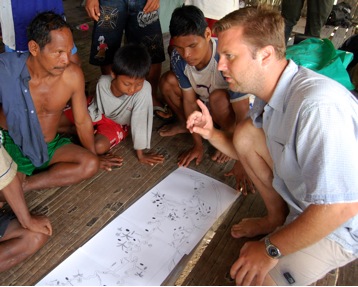Each individual in the village stood in anticipation along the riverbank.
It was 1999, and after a long boat ride through the Peruvian Amazon, Dr. Michael Gilmore ended his trek at one of the four Maijuna villages in the region. Pulling a piece of paper out of his pocket, Gilmore went down the list of five names that he received from famed ethnobiologist Jim Duke a year earlier. Not one was present.
“I probably spoke third grade Spanish back then,” Gilmore said. “And that’s probably too kind; maybe second grade Spanish. When none of the five names were there, I got even more nervous than I already was.”
A year earlier, Gilmore was unexpectedly handed the reins to lead an ecotourism group to the Peruvian Amazon, despite his unfamiliarity with the land, when his PhD advisor forgot his passport. It was then that he met Duke and learned about the Maijuna people.
Fortunately, as Gilmore stood in front of the crowd on the riverbank, an 18-year-old Maijuna man recognized Gilmore from the prior year and welcomed him into his home.
From 1999 to 2004, Gilmore spent time working with the Maijuna for his Ph.D. dissertation on ethnobiology, which is the study of the relationship between people and their environment.
“The first project I did with the Maijuna was very theoretical in nature,” Gilmore said. “But what I realized very quickly while working down there was the fact that the Maijuna had a lot of challenges and needs. Their biological and cultural resources were really under threat from outsiders.”
Several years into Gilmore’s visits, a group of Maijuna elders and leaders approached him with concerns about their endangered cultural traditions, language, biological resources and ancestral lands due to poaching and overfishing.
“They said, ‘We want to take control of our own destiny,’” Gilmore said.
With the help and guidance of Gilmore, the Maijuna established an indigenous federation in 2004 that aims to help and protect the Maijuna people and their ancestral territory and cultural traditions.
“Without protected lands, indigenous communities are incredibly at risk,” Gilmore said. “Maijuna ancestral territory sustains and nourishes the entire Maijuna culture.”
After several long years of conversations with Gilmore, Maijuna leaders and various other allies, in February of this year the regional government approved the creation of a Maijuna protected area of almost 1 million acres, an area that is 22 percent larger than Yosemite National Park.
While the approval marked an incredible victory for the Maijuna people, the fate of their lands now lies in the hands of the national government, who has open plans to construct a road through the center of the protected area.
“If the road is built, there will be huge amounts of deforestation,” Gilmore said. “The Maijuna people don’t go to the supermarket like we do. The forest is their supermarket. So if the forest is not well-preserved, they do not have resources to live off of.”
While continuing the fight for their land, the Maijuna approached Gilmore with the idea of bringing clean water to their villages. They recognized the dangers in continuing to drink straight from the river, which can be especially dangerous and even fatal for young and old alike.
“I thought, ‘Wow! That is an incredible idea. I just don’t know how to do a project like that,’” Gilmore said.
Gilmore spent a number of years searching for help, but several potential allies fell through.
When he returned to Fairfax from Peru in Aug. 2011, Gilmore logged on to the Mason website and found the solution to his problem: Engineers for International Development (EfID), a campus group who exists in order to give students an opportunity to participate in community-driven development programs worldwide.
In June of this year, Gilmore and EfID’s faculty advisor Barry Liner took a team of students, some focused on clean water and others on hygiene, to the Peruvian Amazon to begin working with the Maijuna people.
“The experience was unmatched,” said Gabe Stonebraker, student project manager for EfID’s Maijuna Project. “They’re the nicest people. If you’re trying to teach them something, they listen and they listen intently. The kids, they love to explore and see what you’re doing and they, too, are very attentive. It’s just incredible.”
While one team of students planned the construction of biosand filters, another team interacted with members of the community and, for the first time, showed them proper hygiene procedures.
“Teaching the hygiene lessons to each individual home allowed me to make strong personal connections with many of the community members while sharing simple yet lifesaving information with them,” EfID student member Leslie Temple said. “Many of them stated that it was their first time hearing any of the information included in the lessons, which is basic hygiene information that we often take for granted.”
“That was really powerful stuff the students were doing,” Gilmore said. “They really made a difference in the life of the Maijuna people.”
EfID made good progress in June and are set to continue the project, along with the hygiene education courses, in Jan. 2013.
And, the long-term conservation work of Gilmore continues.
“The ultimate goal is to create a sustainable situation where the Maijuna are empowered and able to defend themselves and their land and are able to control their own destiny,” Gilmore said. “The work will be done when the Maijuna don’t need me anymore. They’ll be empowered to do this work on their own.”







Comments